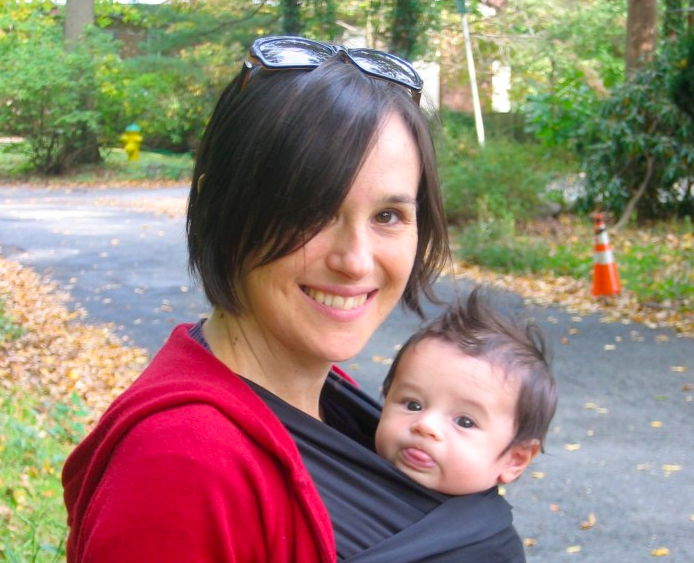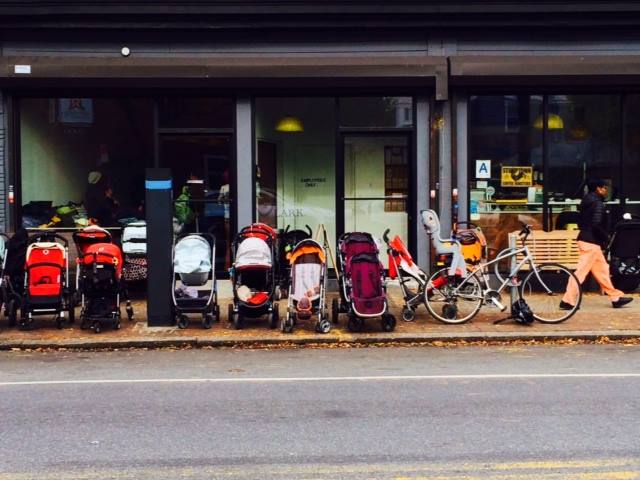Tomorrow, April 1: Postpartum Doulas Will Answer Questions At Lark Cafe About Life After Your Child’s Birth


For all our neighbors who are pregnant or adopting, tomorrow will be a great chance to ask questions about life after the birth of your child!
At 7pm on Wednesday, April 1, neighbors will get a chance to chat with some of our local postpartum doulas at a free meet and greet with Meema Spadola, Grace Veras Sealy, Amber Star, and Ashley Brichter. The event will take place at the always family-friendly Lark Cafe (1007 Church Avenue).
Before tomorrow’s gathering, we wanted to catch up with our neighborhood doulas to find out more about their jobs and the event, which is open to anyone and will include a discussion about making what’s known as a postpartum plan — basically a blue print for what you want life to be like in the months immediately following your child’s arrival.
For our neighbors who may not be familiar with what postpartum doulas do, can you tell us a little more about their role in families’ lives?
Meema Spadola: One way of describing a postpartum doula is to say we’re there to “mother the mother,” although I’d expand that to say that we provide support for the whole family, whether it’s a family of two, three, four, or more people. The day-to-day details vary, but as a postpartum doula I help with breast and/or bottlefeeding; pumping and storing milk; physical recovery measures for mothers; infant soothing techniques; newborn care (like bathing, diapering, etc.); teaching how to “wear” babies in a carrier or sling; making referrals to various resources; educating about normal newborn behavior, appearance and sleep patterns; as well as doing meal prep, errands, light housekeeping, helping set up nursery and gear, and care for older siblings. I don’t take over care of the baby, which can make parents feel a bit helpless and less confident. (The exception, of course, is for those times when an exhausted parent needs a nap!)
Grace Veras Sealy: Postpartum doulas offer professional support for the period right after the baby is born, when the birth doula’s job is done. We are experienced with breastfeeding support and can help with latch and positioning. We are an extra pair of hands to help with laundry, cooking, light cleaning, errand running, support with an older child and we can hold the baby while the parents shower or rest. We offer emotional support, answer questions and can help parents link up with additional postpartum resources.
What inspired you to hold this event at Lark?
MS: [Lark Cafe owner Kari Browne] has created such a great sense of community and has been so welcoming to families with her space at Lark. The new parents’ groups, assorted classes and music are a wonderful resource for the neighborhood. So it felt like a natural choice to hold our event at Lark.
GVS: We wanted to connect with the community, be a resource and offer information as to what it is that we do and how we are different than baby nurses and nannies.
How long have you all been postpartum doulas? What first drew you to the field? What do you love about it?
MS: I’ve been a postpartum doula since 2006. (This is a second career for me after being a documentary filmmaker.) I was inspired to become a postpartum doula after I saw a dear friend experience postpartum depression after the birth of her son. I realized that there’s a lot of attention and excitement around pregnant women and newborns, but not much sustained and practical support in those early weeks and months after a baby is born. I love how purposeful this work feels. I always say that my goal with each client is to work myself out of a job. It’s gratifying to see parents who start out feeling nervous and unsure of themselves become more confident and clear about caring for their baby.
GVS: I’ve been a postpartum doula for under a year. I arrived to this work via birth doula and lactation support work, and also through my own personal experience. When I had my second daughter I felt like I needed an extra pair of hands to be able to recover from the birth, take care of my newborn and my toddler and be present for my husband. I had this idea that kept on popping up: “We need another wife!” Not a sister-wife, mind you, but someone else who knew about what we were going through as a family and could be there to help in a way that the grandmas couldn’t. That is when the lightbulb went off in my head. We didn’t need to add someone to our family, we just needed a postpartum doula. Someone who could be there as we got accustomed to our new life, but did not offer unsolicited advice or was there just to hold the baby. This inspired me to become trained and certified as a postpartum doula, and I love it.
Can you talk a little more about how doulas can help people with confidence? What kind of a difference have you seen it make in people’s lives?
MS: As a postpartum doula I’m not there to tell clients how to parent– I provide information about their baby (or babies), help them to read the baby’s cues, and give them a kind of “toolbox” for caring for their baby. There’s so much judgment aimed at new parents– about feeding, sleeping, etc. Having a postpartum doula creates a safe, supportive space to figure it out while getting some TLC for themselves.
GVS: A doula’s job is not to take over baby care all together but to offer support and information while the parents get to know their new baby and get used to life with this new little being. As time goes on the parents find that they need us less and less because they have been getting to know their child/children’s needs and temperament while we’ve been there as an extra pair of hands, keeping them company and answering their questions. Soon they have fewer questions, trust their instincts more and thus have more confidence as parents. And then our job is done.
Watching a new parent feel and be confident in his/her relationship with their baby and that they know them, their cues, their needs and likes and that they are the most qualified person to be in charge of them is a beautiful thing. Getting to that place takes a little time for all of us, but having extra help can make that time much more relaxed. My goal is to have the parent look back at those early days and weeks and feel a sense of confidence and joy at their own abilities as a parent. Their memory does not have to include me in it, just the good feelings they had of themselves being with and getting to know their babies.
What are some of the most difficult issues you see parents facing in those first three months after the birth of a child, and how do you help with those?
MS: The most common challenges I see are with breastfeeding, recovering physically and/or emotionally from a tough birth experience, and postpartum mood disorders (PMDs). (A lot of people don’t realize that PMDs are the most common medical complication related to childbirth). As postpartum doulas, we’re trained to help with breastfeeding– I’m also a Certified Lactation Counselor, but will sometimes refer out to a Lactation Consultant (IBCLC) in a particularly tricky case. We’re also trained to recognize PMDs and have resource info. And I know that as a postpartum doula, I often help clients by simply listening to them process their birth.
GVS: I would say that exhaustion and getting the hang of breastfeeding are the most common and difficult issues for parents to deal with, but also wading through all of the information that is out there, which is often confusing and conflicting. The presence of a postpartum doula can definitely help with all of these issues. We can help with caring for the baby while parents rest, some of us even do overnight shifts to help parents catch up on their sleep while still offering breastfeeding support at night. We answer questions, and offer resources and evidence-based information so that the parents have a clearer way to get the information they require based on their own philosophy and personal needs.
Is there anything else you’d want people to know about the event, or about postpartum doulas in general?
MS: We are available for all kinds of families– whether or not you gave birth or adopted, are breastfeeding, have a partner or not. I’ve worked with families with two fathers– so you don’t have to be a mother to benefit from a postpartum doula’s support!
As for the event, we’ll be talking about making a “postpartum plan.” I think most pregnant women are familiar with the idea of a “birth plan,” but few people expecting a new baby have made a plan for those first couple months. Who’s on your team? Who are the helpers (not just visitors!) in your life? Will have your mother or mother-in-law come to stay be truly positive or will it make you crazy? Can you come up with a “we’d love if you could help with ____________” list for friends and visitors? These are the kinds of questions that are important to think through.
GVS: The event is FREE! We welcome your questions and would love to get to know you and for you to get to know us.